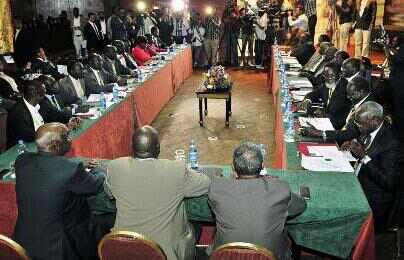S. Sudan peace talks adjourned amid calls for crisis summit
By Tesfa-Alem Tekle
March 5, 2014 (ADDIS ABABA) – Special envoys from the Intergovermental Authority on Development (IGAD) who are mediating between South Sudan’s warring factions have proposed an extraordinary summit to discuss the crisis in South Sudan.

The calls from regional mediators come after the second round of talks between the South Sudan government and the SPLM/N-in-opposition in Addis Ababa were postponed until 20 March.
Sources close to the talks told Sudan Tribune that negotiations had been postponed to allow IGAD discuss the agenda of the dialogue with civil society representatives.
“PROFOUND DISMAY”
In a statement extended to Sudan Tribune on Monday, Taban Deng Gai, head of the rebel delegation, expressed their “profound dismay” that talks were breaking off without a comprehensive agreement to end ongoing conflict in the country.
Gai also expressed concern that the Ugandan army (UPDF), which has been providing military support to the South Sudan army (SPLA), appeared to be expanding its operations, rather than progressively withdrawing as was agreed under ceasefire arrangements.
He has called on the international community to step up pressure on the government to scale back Uganda’s military involvement.
“This measure is critical and vital to create an amicable environment for the highly important next round of peace talks,” he said.
Of the 11 political detainees arrested in connection to an alleged plot to overthrow the government only seven have been released.
Gai said the continued detention of the senior political figures, including former secretary-general Pagan Amum, was “disheartening” and a “serious violation” of an agreement signed on the release of detainees.
CIVIL SOCIETY TO BE CONSULTED
Meanwhile, officials said IGAD mediators and the bloc’s partners are expected to convene a conference for civil societies in the Ethiopian capital, Addis Ababa, during the second week of March.
The civil society meeting will be based on the agreed agenda by parties to the peace talks.
IGAD wants to conduct consultations with civil societies on the guiding principles to ensure their views are reflected in the Declaration of Principles and framework for dialogue.
A South Sudanese civil society in Addis Ababa has welcomed IGAD’s decision to hold consultations.
“This is a good move in our view. This step would ensure an inclusive process toward permanent and lasting peace in South Sudan and among our communities,” Steven Puoch Riek Deng, head of public relation affairs for the Humanitarian Liaison Office of the SPLM-in-Opposition told Sudan Tribune.
“As civil society we call for an inclusive process which involves all sections of our society,” Deng added.
Conflict in South Sudan erupted in the capital, Juba, in mid-December after what president Salva Kiir claimed was an alleged coup attempt by former vice-president turned rebel leader Riek Machar, an allegation he rejects.
The fighting pitted forces loyal to Kiir against rebel troops aligned with Machar, with violence spreading throughout the country as both sides battled for control of strategic areas.
The conflict has claimed the lives of an estimated 10,000 people and displaced more than 900,000 people, including more than 190,000 who have fled to neighbouring countries.
Deng has called on South Sudanese people to move beyond tribal interests and rivalries in order to return peace and stability to the country.
Although the IGAD-led mediation secured a ceasefire agreement on 23 January, the peace pact has so far failed to halt violence on the ground, with both sides accusing each other of violating the terms of the deal.
MONITORS DEPLOYED
IGAD said it has deployed an advance team to selected sites to monitor the ceasefire, as part of an agreed Monitoring and Verification Mechanism (MVM).
According to the bloc, the two warring parties will also send representatives to participate in the monitoring operations.
“The special envoys urge the parties to fully cooperate with the MVM and to abide by the cessation of hostilities agreement and show their political will and commitment to end the war,” IGAD said in a statement on Monday.
The bloc has warned that South Sudan is facing “an appalling humanitarian catastrophe”, urging the international community to step up pressure on parties to the conflict to ensure they comply with the ceasefire agreement and that urgent humanitarian assistance is delivered.
Gai, meanwhile, said rebels were committed “to IGAD remaining in the driving seat of this peace process”, adding that “the next round of talks should be inclusive for the current crisis to be resolved comprehensively”.
(ST)
